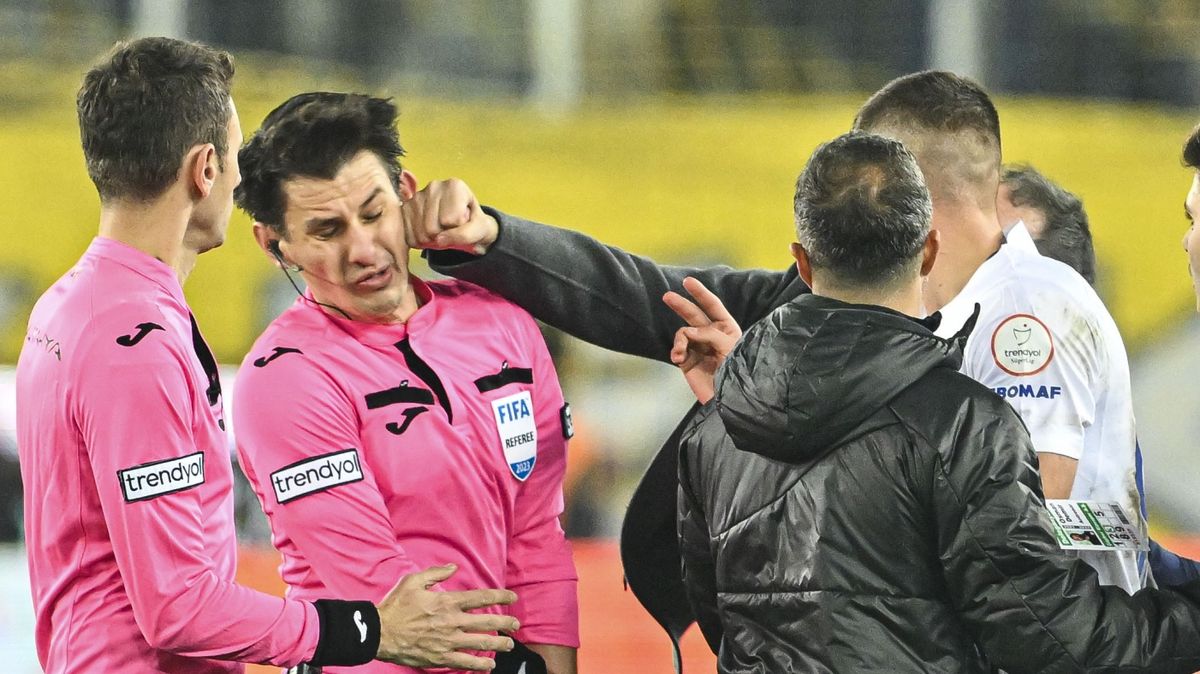Professional football in Turkey has been suspended after a referee was punched to the ground by a club’s president following a match in the country’s top division.
Halil Umut Meler, one of Turkey’s top referees, was hit by MKE Ankaragucu president Faruk Koca, who ran on to the pitch after his team conceded a 97th-minute equaliser in a 1-1 Super Lig draw with Rizespor in Ankara.
The attack sparked “a melee of players and officials either joining the chaos or trying to intervene”. Meler was also “kicked in the head at least once” as he lay on the ground, said Sky News.
Subscribe to The Week
Escape your echo chamber. Get the facts behind the news, plus analysis from multiple perspectives.
SUBSCRIBE & SAVE
Sign up for The Week’s Free Newsletters
From our morning news briefing to a weekly Good News Newsletter, get the best of The Week delivered directly to your inbox.
From our morning news briefing to a weekly Good News Newsletter, get the best of The Week delivered directly to your inbox.
Turkish FA (TFF) chairman Mehmet Buyukeksi said that the attack represented “a night of shame for Turkish football”. He also announced the indefinite postponement of all professional matches in the country.
‘Violence rife in every main European league’
In a statement, the TFF blamed the attack on a toxic culture towards referees fostered in recent years by players and club officials. It said that the “irresponsible statements of club presidents, managers, coaches and TV commentators targeting referees” had “paved the way” for the attack.
Violence on the pitch remains rare, but trouble from so-called football “ultras” seems to be surging, with disturbances “rife in virtually every main European league this year”, said The Times.
In the Netherlands, the government has been “wrestling with a surge in crowd trouble” with several matches being interrupted or called off. In Greece, top-tier football is being played without any supporters present until February 2024 in an effort to curb violence. In Sweden, France, Spain and Italy, authorities are also struggling with violence from ultras.
And while in the UK “hooliganism at games may be rarer than it once was”, there is also “no room for complacency”. The Euro 2020 final between England and Italy at Wembley was “marred by scenes of anarchy outside”, said The Times. The police have also condemned “extreme violence from right-wing protesters” at a pro-Palestine march in November, which they said was carried out by a group made up “largely of football hooligans”.
‘Rise of ultra culture’
There is “reason to believe that certain trends have fed into the return of ultra culture, that common threads may run right across Europe”, said The Times.
Part of the reason may be the “cathartic effect” of attending matches again after lockdowns. But it might also be that those new to the ultra groups or returning to them are “eager to assert themselves and earn their place in the hierarchy”.
Drug use among fans is also soaring, said the Daily Mail. A study by researchers from the University of Stirling found there has been a marked increase in supporters reported to have taken cocaine, “with the drug an influential factor in violence and anti-social behaviour”.
But it is “too simplistic” to reduce the increase in football violence to drug use alone. “Going to the football and being part of a social group offers a sense of purpose and escape from daily lives,” continued the paper. While for others “it allows them to display a semblance of masculinity they are unable to show in other walks of life”.
Why that might lead some football-goers towards violence “is another question” but there is a growing subculture of fans “who go for the experience, where the football is only a part of the day”.
The far-right, too, has “always been interested in football as a means of recruiting”, added the Mail, suggesting that the rise of far-right groups and ideologies across Europe could also be “fuelling violence” around football.

